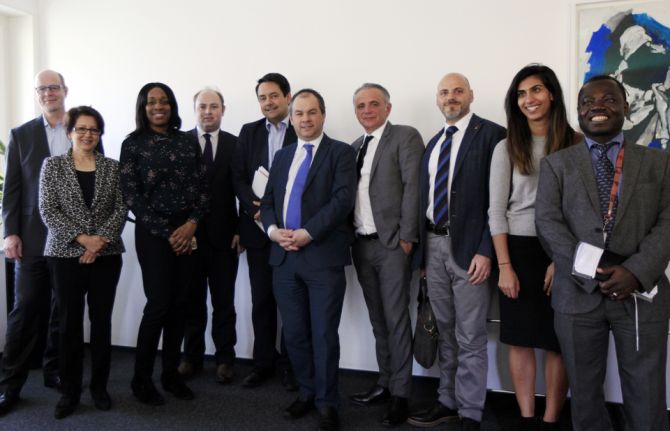

Feature Story
British parliamentarians visit UNAIDS
31 March 2017
31 March 2017 31 March 2017UNAIDS welcomed a group of prominent British parliamentarians from the cross-party International Development Committee to discuss the role of lawmakers in ending AIDS and contributing to global health. The parliamentarians were Labour Member of Parliament and Shadow Secretary of State for International Development Kate Osamor, Stephen Twigg, Labour Member of Parliament and Chair of the International Development Committee, Conservative Members of Parliament David Mackintosh and Paul Scully, and Baroness Sheehan, member of the House of Lords and the Liberal Democrat spokesperson for international development.
Deputy Executive Director Luiz Loures chaired an informal discussion that began with the Members of Parliament sharing their own experiences of visiting AIDS programmes in Africa and Asia. They spoke of their acute awareness of the complicated nature of the AIDS response, and Mr Twigg highlighted the role that discriminatory laws played in creating barriers to services. Mr Loures noted that one of the biggest challenges to the AIDS response was the risk of complacency. Baroness Sheehan expressed her concern about the increased vulnerability of girls and young women. The discussion explored the role of civil society and the shrinking space for civil society and Mr Scully noted the increasing need to mobilize domestic resources.
Mr Loures highlighted the critical role of parliamentarians in ensuring that health and development international assistance is maintained and scaled up. Mr Mackintosh highlighted the need for increased efficiency and analysis on returns on investment to enable parliamentarians to advocate for sustained and increased funding.
Ms Osamor thanked Senior Adviser David Chipanta for sharing his personal story of living with HIV and the life-changing impact that access to treatment has had on his life.
The visit was organized by STOPAIDS, STOP AIDS Alliance, Results UK and Malaria No More. The United Kingdom is the fourth largest donor to UNAIDS.



